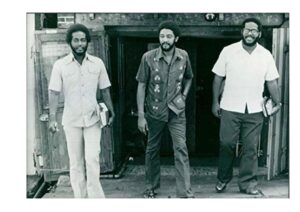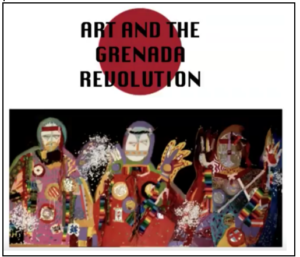March 13, 1979
Grenadians rose up and grabbed their freedom
Celebrating the 42nd anniversary of the Grenada Revolution

Forty-two years ago, on March 13, 1979, the people of Grenada rose up from under the brutal Gairy dictatorship and seized power. In the four and a half short years of the Revo’ Grenadians brought about maternity rights laws, free education, free health care, economic reform, an increase in democratic control, a huge increase in free university education, infrastructure development including the building of an international airport, expanded social housing, a significant increase in employment, a teacher education programme, a huge literacy programme and much more.
A Remarkable Thing
A remarkable thing happened in Grenada on March 13th this year, 2021. A celebration of the 42nd anniversary of the Grenada Revolution took place, with over 1,000 persons attending electronically from across the globe. This is the first time since the American invasion that the celebration has taken place on this scale and with such breadth.
The Revo’ was launched on the morning of March 13th 1979, after several years of planning by the New Jewel Movement, following military training provided to the revolutionaries by a friendly government.
Within hours all organs of state had submitted to the Peoples Revolutionary Government (PRG) and Grenada’s four and a half years of people power had begun. The success of the Revo’ in bringing material and other benefits to the Citizens of Grenada is uncontested despite criticisms from a small number of detractors. Gains were made in social benefits for women and social security for all; educational opportunities were considerably expanded across all sectors and made free; free healthcare was introduced; a house repair programme was instituted as well as the introduction and construction of social housing; cultural programmes were supported by the PRG and a basic form of democratic accountability was established, whilst a new constitution was being formulated.
Almost all of these gains were destroyed by the occupying US forces in October 1983. Following the killing of Prime Minister Maurice Bishop, US President Ronald Reagan used his death as a pretext for the invasion and to deflect attention from the huge number of American personnel killed in Lebanon by a suicide bomber a few days earlier. In attempting to destroy the memory of the Revo’ the US forces also attempted to liquidate its remaining leaders through a show trial.
In holding their first international celebration of the Revolution the Grenada Revolution Celebrations Committee spelled out that the anniversary was not to be considered a historical seminar but a programme designed to contribute to overcoming current challenges faced by Grenada and other countries brought about by Covid.
Under the theme of Celebrating the Grenada Revolution in the times of COVID: Focusing on the economy, education, health and people’s power, contributions were invited from Dr. Sonia Nixon, Public Health Specialist; Professor Anne Hickling-Hudson, one of the creators of the education system developed under the Revo’; and Dr. Brian Francis, a leading Caribbean economist. They were all either working in support of the Revo’ or, in the case of Dr. Nixon, were one of the beneficiaries of the Revo’, being amongst the first group of students sent by the Revo’ to Cuba to study medicine.
All gave an analysis of how the Revo’ tackled deep-seated problems inherited from the Gairy period and successfully overcame them. In doing so they pointed out how these initiatives could be used by the present Grenadian administration to overcome the significant difficulties posed to Grenada by COVID. The recording of the seminar can be seen below at the Grenada – Forward Ever website, page http://grenada-forwardever.net/archives/388.
However, the key takeaway from the event were: –
The Celebrations included a rich seam of activities from across Grenada’s cultural heritage including music videos, drumming, a rendition of the National Anthem and the Revolutionary Anthem (Forward March), poetry, pan playing and a display of contemporary art and art developed during the Revo’.
Health
Dr Nixon was amongst the first beneficiaries of the medical scholarships offered to Grenada by Cuba, leaving Grenada to study in November 1983. She spoke with passion about the very poor health conditions in Grenada at the overthrow of the dictator Gairy. The situation was so grim that Maurice Bishop took over the health portfolio alongside his duties as Prime Minister of the PRG.
Amongst the things bequeathed to the Revo’ were a severe shortage of nursing professionals, lack of drugs in all health settings and poor food in the hospitals. A majority of health centres had no dental professionals assigned to them. “Change in the health sector was urgent”, said Dr Dixon. Within a few weeks of establishing relations with Cuba, their Government sent a medical team of nurses, doctors and dentists to Grenada, which alleviated the dire health situation. This allowed for proper health provision across the three islands that made up the state, with medical and dental care supplied to the sister islands of Carriacou and Petit Martinique for the first time in many years.
As part of along-term solution and with no money the PRG encouraged a ground-up approach to health. To do this they concentrated on strengthening the country’s primary care system, “… emphasising the importance of care where people lived…”, Dr Dixon explained.
She emphasised that all governments must recognise health as a basic human right, as the PRG had done. She regretted that the PRG was unable to complete the comprehensive overhaul of the health system due to the collapse of the Revo’, despite the fact that over 60% of the 350 students on scholarships in Cuba were studying healthcare or medicine.
Dr Dixon stated that the current Government of Grenada should appreciate that healthcare should not come just from the top but should involve local communities. Despite the years that have passed since the Revo’ ended relations with Cuba have been maintained and during 2020 a medical team was sent by them to assist in combating Covid.
Education
Describing the Grenada education as “A dysfunctional education system left by the British…” across the Caribbean, with Grenada no exception, Dr Hudson explained the challenges faced by the PRG. For example, over 67% of primary teachers were untrained and 70% of secondary school teachers were unqualified. As in health, there was no money in the old or new budget for teacher training. So, with little resources, a National In-Service Teacher Education Programme (NISTEP) was instituted into which 300 primary teachers were recruited and the NISTEP programme was accredited by the University of the West Indies. This was a model for other countries.
An adult education programme, the Centre for Popular Education( CPE) enrolled 4,000 participants resulting in a reduction of illiteracy from the high 20s to less than 4%. In the CPE a high level of challenging ideas used during the literacy programme. Across industry and the Civil Service weekly work-study meetings took place, in which all staff, including the gardeners, cleaning staff, administrators as well as academic staff were involved.
Parish and Zonal councils were set up to be trained in and became involved in the development of the society, including the discussion on the budget. Likewise, the National Women’s Organisation (NWO) set up programmes that contributed towards the education of families with programmes such as childcare and feeding and political learning.
Like most post British Empire territories in the region, maths and science teaching was very poor. Lack of this aspect of education resulted in harm to Grenada’s students and also harmed the country. Led by Jacqui Creft, Minister of Education, Grenada requested and was supplied by Cuba with a team of maths and science educators.
Along with this assistance 300 scholarships were offered by Cuba to Grenada, the greatest proportion of educational aid offered to a country by Cuba. Minister Creft worked with colleagues on serious long-term education planning to develop a strategy required to advance education in Grenada. Needless to say, the US invaders quashed this initiative.
The Economy
Through a detailed presentation the distinguished economist Dr Brian Francis showed that Grenada during Covid was similar in appearance to the Gairy period at the time of the Revo’. The Grenada Government’s income has collapsed due to Covid but in going through a thorough explanation of Grenada’s economy Dr Francis showed that agriculture flourished during the Revo’. Now, agriculture has ceased to be a significant feature of the economy. During this current period, agriculture “has to be the main player during Covid”, explained Dr Francis.
Continuing on this theme, he criticised the argument that said an economy based on agriculture was “backward”. This view has been overturned by Covid, where a failure to appreciate agriculture has exposed the weakness of Grenada’s economy.
In closing, he classified the politics of the Revo’ as being Marxist-Leninist but the economics of the Revo’ was capitalism, with central planning. The lesson from the Revo’ is that people have the ability to advance if they diversify the economy within each sector, given the example of the development of agro-industrial processing currently being undertaken, a project developed during the Revo’ to enhance the agricultural base. In addition, there must be a building of social capital. There must also be mass involvement of the people, where criticism is welcome. Criticism and trouble makers are speaking for the voiceless.
Overview of the Celebration of the Grenada Revolution
The event was a fantastic example of the benefits arising from the foundations built by the Revo’ during its short four and a half years. What does it show for political development and people-power in the coming period? It is hard to say. The organisers and presenters were, like this author, of a certain age. Without some rapid development of a number of cadres and the development of organisational politics, the era of the Grenada Revo’ will cease to be remembered.
On a positive note, this was the first international celebration of the Revo’. However, the celebration of March 13th has taken place since 2016 and each one has been an advance on its predecessor. The 2021 event has demonstrated the continued strength of the Revo’ across the globe, which augers well for the future.
Overcoming the attempted destruction of cultural aspects of the Revo’
Martin Felix, one of the contributors, prepared a short video on the art of Grenada. This ranged from the images carved on stone, pictoglyphs, and a few rare examples of painted stones, pictographs, remnants of the Caribs and Arawaks of Grenada, to the art that flourished during the Revo’.
In doing so, he pointed out the similarities between the actions of the European invaders of Grenada and that of the US troops who invaded in October 1983. The former destroyed the physical presence of the original inhabitants. Having done so they then set about eradicating their memory through a policy of destruction of their cultural artifacts. The invading Americans deliberately destroyed every vestige of public art associated with the Revo’. They teared down billboards, renamed locations and overpainted murals. In some cases they painted murals extolling the invsion, claiming that it was done by local people, in other examples they erected memorials to their troops, again claiming that this was a spontaneous outburst of gratitude from Grenadians.
However, they failed in that part of the mission, which was designed to erase from the collective memory the purpose and achievements of the Revo’. The memory of the Revo’ continues in numerous examples, close to the heart of Grenadians with a wide range of contemporary art inspired by or arising from the Revo’.
Martin welcomes you to share his video, the link of which is below..

